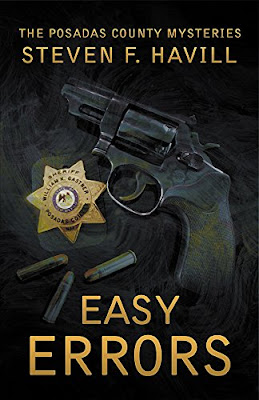My fears
after reading Arkady Renko’s previous adventure have proven
unfounded. I’d predicted that Tatiana,
#8 in the Russian crime series featuring the intrepid “investigator
of special cases,” would mark Renko’s valediction. Soon after I
wrote those words I learned his creator, Martin Cruz Smith, was
working on yet another episode, giving me a sliver of hope my
forecast had been wrong. Had I Renko’s fortitude, stamina, and
seemingly unlimited regenerative powers, I might have held my breath.
But I knew he carried a bullet in his brain that could kill him
instantly without warning, and considering the beatings, stabbings,
being locked in a freezer and the exposure to lethal radiation he’d
survived since we first met him in Gorky
Park,
the law of probability had to have his number in sight. At some point
I would have no choice but bid him goodbye.
Well, it’s
not this time. Not in #9, The
Siberian Dilemma.
That’s not to say he doesn’t have another close call. This time
it’s being mauled by a bear on a Siberian tundra.
“‘Play
dead or be dead,’ he recalls his father telling him as a youngster.
‘Lie flat on your stomach to protect your vital organs. Lace your
hands over the back of your neck to cover the arteries there.’ It
was a long time since Arkady had felt any reason to be thankful to
his father. He rolled onto his stomach and covered his neck as
instructed. The bear turned Arkady over. It mauled him and shook him
like a rag doll. Play dead or be dead. Pain dug deep within him as if
he was being torn from the inside out. Yellow teeth took his parka
and flesh down to the bone of his arm, and he felt his right hand go
numb and limp. The bear redoubled his attack, picking Arkady up,
swinging him left and right, and dropping him. He tore the skin off
part of Arkady’s forehead. Arkady heard the huffing and snuffling
and smelled the rot of his breath. The bear wouldn’t quit. Arkady
played dead. There was nothing else he could do. Eventually the beast
would give up and leave him alone...”
 It would be reasonable at this
point to wonder how it is that a Moscow police investigator finds
himself on a Siberian tundra being mauled within inches of his life
by a very hungry brown bear. The answer, of course, is another of the
complicated plots enmeshing the aging Renko, who remains at odds with
his boss and who can never seem to resist tugging the capes of very
powerful gangsters despite the virtual immunity they’ve attained
from their friendship with Russia’s head gangster. In The
Siberian Dilemma this
would be Vladimir Putin, with the title “president,” and private
properties including “ocean-cruising yachts...four estates with
swimming pools, horse stables, tennis courts, and cascading
waterfalls...and one with a separate house for ducks.
It would be reasonable at this
point to wonder how it is that a Moscow police investigator finds
himself on a Siberian tundra being mauled within inches of his life
by a very hungry brown bear. The answer, of course, is another of the
complicated plots enmeshing the aging Renko, who remains at odds with
his boss and who can never seem to resist tugging the capes of very
powerful gangsters despite the virtual immunity they’ve attained
from their friendship with Russia’s head gangster. In The
Siberian Dilemma this
would be Vladimir Putin, with the title “president,” and private
properties including “ocean-cruising yachts...four estates with
swimming pools, horse stables, tennis courts, and cascading
waterfalls...and one with a separate house for ducks.
“In this manner, corruption
was quantified and understood.” And sounds rather familiar to some
of us, as well.
Renko’s mission to Irkutsk,
known as the Paris of Siberia, is twofold. One is official and the
other private. Zurin, the Moscow prosecutor who shares a mutual
dislike with Renko, has ordered him to interrogate a prisoner who’s
being held in a prison there charged with trying to kill Zurin
himself. Renko’s private reason is to find his lover, Tatiana
Petrovna, the fearless investigative reporter who slipped off to
Irkutsk to interview one of the gangster oligarchs who has announced
his intention to seek Putin’s job in the next national election.
“Anyone who challenges the
Kremlin runs the risk of being murdered,” Tatiana’s boss, Sergei
Obolensky, publisher of the news magazine Russia Now,
tells Renko. If Tatiana’s with the oligarch then she, too, is a
target, Renko know. He’s worried because she did not returned to
Moscow when expected, and Renko has no way to communicate with her.
The
ensemble cast includes Victor Orlof, Renko’s alcoholic
detective/sidekick, who’s in the drunk tank when Renko leaves for
Siberia. “They were partners in a peculiar business and he had
come to count on Victor for what he felt was half his intelligence
and most of his wit. Suddenly he had no one to take Victor’s
place.” But a new sidekick kicks in by coincidence on the flight to
Irkutsk. Rinchin Bolot, a friendly Irkutskian who introduces himself
as a “factotum,” or man of many talents for hire. Renko hires
him, making me a little nervous because for all we know Bolot is
really working for someone else—Zurin the prosecutor or one of the
two oligarchs who own most of Siberia. One of them is the man seeking
to unseat Putin.
Also
back in Moscow is Zhenya Zurin, the orphan chess-wiz Renko had
befriended as a child and then mentored him as he might an adopted
son. A threat of Zhenya’s “disappearing” is used to pressure
Renko once he’s in Irkutsk and is given an extra-curricular
“assignment.”
As
to his own safety, Renko uses a line we’ve heard from him before,
this time when Victor’s sister tells him how impressed she is
that he stood his ground when an angry bear charged at
him in
the zoo she directs.
Someone had released the bear and its mate, and Renko disabled it
with a gun that fired
narcotic cartridges. It was, she says, “As if you didn’t care.”
His
response, which relates to the bullet lodged in his brain, “That’s
my secret weapon.”
Recovering
from his mauling in Siberia, the prospect of death occupies his mind
with more perspective. “Arkady had never wondered or worried too
much about his legacy, such as it was.” we are told. “He had
never felt the need to leave his mark on the world, either through
achievement or progeny.
“There
were those who’d be sorry to see him gone and those who’d be
delighted. Given the identity of those in both camps, the latter was,
in its own way, as much a compliment as the former.”
The
book’s title appears as a riddle regarding a person’s choices
when either of two options will almost surely be fatal. In explaining
it, Renko uses the analogy of a man who falls through the ice on a
lake. “If he pulls himself out of the water onto the ice, he’ll
freeze to death in seconds, a minute at most. If he stays in the
water, he’ll die of hypothermia in five…
“The
lesson is it’s better to take action than be passive...better to
fight than to surrender, even if you know you’re going to die.”
As
usual in the Renko series I found the setting to be ferociously
realistic. This authenticity, I learned at the end of The
Siberian Dilemma, did not come
from reading travel guides. In his acknowledgments the author tells
us how he prepared for this Renko adventure.
He
thanks Luisa Smith, “my invaluable travel companion with a magic
camera...Don Sanders for his help in making the Siberian trip
happen...Arkady Persov from Irkutsk generously entertained us while
showing us his city and the natural wonders of Lake Baikal...Lyuba
Vinogradova has been my brilliant translator and research assistant
for more than twenty years. She traveled from Mozambique to Siberia
to be part of the team. Finally, there is Andrew Nurnberg, my loyal
friend and agent for almost forty years. He has traveled with me on
research trips to Siberia, Moscow, Tver, Berlin, and Havana and
always kept his sense of humor. These friends buoy me up and keep me
on my feet.
And
let me add my gratitude, as well.



